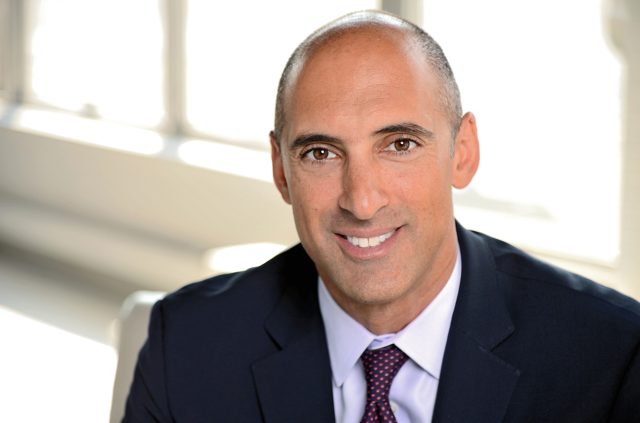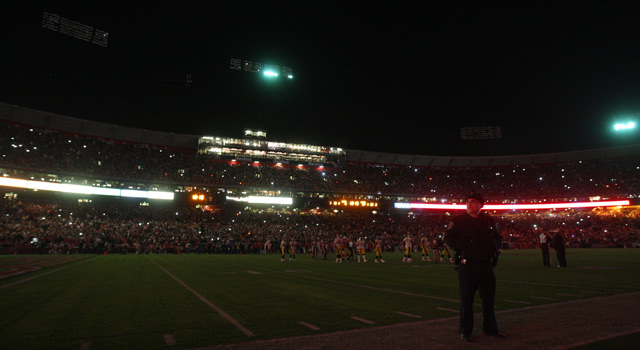
Since 1973, the National Football League has prevented local TV stations from broadcasting games when tickets aren’t sold out—and Federal Communications Commission rules enable this decidedly fan-unfriendly policy. The rules are finally close to being overturned, and if they are you can thank David Goodfriend.
Founder of the Sports Fans Coalition, Goodfriend is an attorney and lobbyist with years of experience in government and private industry. He was a Clinton Administration official, a Congressional staffer, legal advisor at the FCC, and executive at Dish Network. The Sports Fans Coalition teamed with four consumer advocacy organizations in 2011 to petition the FCC to stop supporting the NFL’s blackout regime.
In practice, the FCC rules primarily benefit the NFL because the nation’s other major sports leagues don’t punish fans by keeping games off local TV when they aren’t sold out. The NFL has resorted to astroturfing to make it seem as though the general public supports blackouts, and dismissed opposition from fans as being incited by cable and satellite companies. NFL attorney Gerard Waldron (who also lobbies for broadcasters on other matters) disparaged Goodfriend’s motivations, telling Ars that the Sports Fans Coalition “has received funding from Dish, Time Warner Cable, and Verizon,” and that Goodfriend “has close and longtime ties to Dish as their former in-house lobbyist and now is an outside consultant.”
“It’s beyond politics”
Most of that is true, Goodfriend acknowledges, but that doesn’t mean fans aren’t on his side. Fans have written to his organization “in their own words and oftentimes in their own hand why they hated blackouts so much,” Goodfriend told Ars in a phone interview. “We had a disabled veteran, an elderly woman, people who say ‘these blackouts don’t inspire me to go to the games because I can’t go to the games.’”
Fans also wrote to the FCC in support of the Sports Fans Coalition petition to end blackout rules. The FCC itself voted 5-0 last December for a preliminary proposal to get rid of the rules.
“It’s beyond politics,” Goodfriend said. “It’s something that a progressive consumer advocate can support and it’s something a conservative deregulatory person can support.” The FCC has three Democrats and two Republicans, often casting 3-2 votes on controversial matters, but was unanimous in taking the first major step toward ending its support of blackouts. The FCC has been taking public comments before making a final decision. Goodfriend hopes for a vote next month.
Ending NFL blackouts isn’t the only fight Goodfriend and the Sports Fans Coalition are taking on. The group, which includes former Bush administration official and Republican strategist Brad Blakeman, also lobbies against taxpayer-financed stadiums and filed a petition to deny the proposed Comcast/Time Warner Cable merger. The group accuses Comcast and TWC, which own regional sports networks throughout the country, of using their market power to charge unreasonable prices for sports programming and of withholding sports content from rival pay-TV providers when they don’t pay up. Many Los Angeles Dodgers fans can’t watch games this year because TV providers refused to pay what they say are outrageous fees demanded by TWC.
Goodfriend’s coalition—which has a $96,000 budget—used to receive funding from Verizon and Time Warner Cable, but no longer does, he said. Goodfriend declined to say why those companies stopped funding his group, but said they originally gave money “because big media companies don’t like being pushed around by sports leagues either.” But over time, cable companies have increasingly become content owners, with Comcast’s 2011 acquisition of NBCUniversal increasing antitrust concerns.
Contrary to Waldron’s statement, Goodfriend said his sports fan group never received funding from Dish itself. But Dish is part of the American Television Alliance, which contributed to the coalition this year, and Goodfriend still lobbies for Dish and other clients in his private practice.
The Sports Fans Alliance’s biggest corporate funder is Enterprise Rent-A-Car, Goodfriend said. Publicly financed stadiums are often paid for in part by rental car taxes, he explained. This was one of the first issues the coalition tackled after it was founded in 2009.
Fighting for fans—and for Dish Network
Goodfriend—a Green Bay Packers fan—was at Dish between 2001 and 2009, serving in several positions including vice president of law and public policy. Today, Goodfriend lobbies for Dish on net neutrality, reauthorization of the Satellite Television Extension and Localism Act, and against the Comcast/TWC merger. His time as a Dish employee helped shape his sports-related lobbying.
“That’s where I learned how screwed up the whole sports media system really is,” he told Ars. “At Dish we generally were really tough negotiators with everybody but when it involved the sports leagues we just said, ‘ok.’ I thought that was really odd. I actually brought some ideas to the company about ways to sue sports leagues and they said, ‘we’d love to do this but they’re too strong. They’ll kill us.’ That’s a very unusual thing to hear at Dish Network where they usually will sue anybody for any reason. That was my first education into how skewed the market is when it comes to sports.”
Goodfriend started the sports fan lobby group because “there’s a tremendous amount of government intervention and support for sports written into federal law and state law, but there was no real consumer advocacy group for fans. Ralph Nader had started the League of Fans a while ago but that was sort of an all-purpose place for fans to complain, it wasn’t just centered on public policy.”
Professional sports leagues enjoy a number of exemptions from antitrust law and have frequently convinced local governments to hand over taxpayer money to finance new stadiums. While this may appear to be a separate issue from TV blackouts, Goodfriend sees them as feeding into each other. Fans (and non-fans) pay for the stadium construction, and then pay exorbitant amounts of money to attend games. The teams have little pressure to lower ticket prices because government-sanctioned blackout rules sometimes force fans to choose between buying a ticket or not seeing the game at all, Goodfriend said.
“Cincinnati is a great example,” he said. “They had to float municipal bonds, they’re having trouble paying the financing on those bonds, so schools are suffering while the taxpayers of Ohio are paying to subsidize a stadium for the NFL. Oh and by the way a couple of years ago 75 percent of all home games at Cincinnati were blacked out. Let me get this straight: [Say] I’m from Cincinnati. I supported this team my whole life. My taxpayer dollars go to support the stadium, and what do I get in return, I can’t watch the game on TV. Oh and I want to go, but wait a minute, the ticket prices just went up and I’m unemployed so I can’t afford it.”
Who actually benefits from blackouts?

“If the NFL cared so much about selling out stadiums they’d lower their damn ticket prices.”
“If the NFL cared so much about selling out stadiums they’d lower their damn ticket prices,” he said. “That’s what airlines do. When’s the last time you flew on an empty airplane? If an airplane isn’t selling out they lower the price to fill up the plane because they don’t make money on the seats.”
Nine economists told the FCC in a filing that “There is no evidence that the current blackout practices of the NFL have a significant effect on attendance, revenues, profits and the allocation of television rights between over-the-air and MVPDs [multi-channel video programming distributors] broadcasters.”
Blackouts harm local businesses, particularly bars and restaurants that would show the games to attract customers, Goodfriend argued. “Blackouts are just a really anti-consumer power play by the league,” Goodfriend said. “Local broadcasters don’t like them, local businesses don’t like them, and fans sure don’t like them.”
The NFL itself is a tax-exempt nonprofit, though all of its teams (except the nonprofit Packers) must pay taxes. In all, the league makes more than $9 billion a year, more than any other US sports league.
Goodfriend says the NFL keeps games on broadcast TV not out of the goodness of the league’s heart, but because the large viewership of broadcast TV helps sell ads.
“As long as Budweiser, Pepsi and General Motors, and other big consumer brands pay top dollar to advertise on NFL games, and as long as people still use broadcast, that dynamic is not going to change,” he said.
The NFL has shifted a fair number of games to pay-TV, demonstrating that the league isn’t avoiding cable when it can get a good enough deal. Monday Night Football is on ESPN, and Thursday night games are on the NFL Network.
“They’re doing that [moving games to cable] anyway,” Goodfriend said. “They did that with the sports blackout rule in existence. The notion that they’re going to walk away from millions of dollars in broadcast advertising revenue just to sell a few thousand more tickets is laughable.”
Ticket shenanigans alleged
In one filing this year, the Sports Fans Coalition and other groups opposed to blackout rules accused the NFL of pressuring broadcasters to buy unsold tickets to avoid blackouts.
“The commission should investigate whether its licensees owned by or affiliated with Fox, NBC, ABC, and CBS purchased blocks of game tickets in order to avoid local blackouts during the 2013 season, and whether such purchases were made at the behest of the NFL,” they wrote.
The groups didn’t offer any specific proof. Goodfriend attributed the information to “an executive with a lot of experience in the sports industry.” Waldron declined to comment on this charge, but the NFL did not deny it. In a later filing, the NFL said, “If [the Sports Fans Coalition’s] real agenda were to look out for fans, as opposed to representing the interests of MVPDs, SFC would be cheering the reduction in blackouts. Instead, it expresses disapproval of clubs’ and local businesses’ efforts to avoid blackouts by purchasing blocks of tickets for certain games in the 2013 season, as well as the NFL’s ability to adjust the deadline to sell out games.”
Goodfriend views that as a “tacit admission.” An FCC spokesperson told Ars that the commission “can’t confirm or deny or comment on any investigations,” adding that “there has not been [a] finding issued.”
“That terrifies the billionaires”
For all the controversy over blackouts, eradicating the FCC rules might not change much. The Copyright Act of 1976 may provide legal cover for blackouts. Even without rules enabling blackouts, the NFL could insist that pay-TV providers honor blackouts when negotiating private contracts. But this would open the NFL to something it doesn’t want, Goodfriend said: a free market.
“The pay-TV companies might say, ‘ok, well we really want the NFL Network so we’ll give you what you want. Or they might say, ‘what will you give me? How about you reduce the fee you charge us?’ That’s called a market. That’s how markets work. There is negotiation, there is bargaining, there is leverage.”
Goodfriend occasionally takes on a conspiratorial tone. “Our website was hacked recently. I’m not going to surmise who would want to hack our website,” he said.
He sees the NFL as “a puppeteer sitting way up high,” pulling the strings while broadcasters, pay-TV companies, merchandisers and distributors fight among each other. In this view, ending the blackout rules would be the first crack in the NFL’s armor—even if the league is able to preserve blackouts through private contracts.
“What’s really going on here is the NFL is terrified that someone is going to pull back the curtain and reveal all these public subsidies to the point where the public says, ‘no more,’” Goodfriend said. “‘We’re no longer going to subsidize your stadiums, your taxes, your business, we’re just not going to subsidize it anymore.’ That terrifies the billionaires.”
reader comments
93